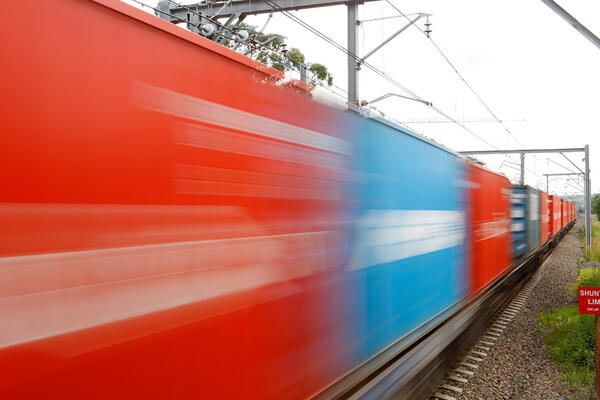
Emissions and economic modelling of NSW road and rail freight
This research aimed to model the impact of various policy levers on carbon emissions from road and rail freight.
The research also aimed to identify the economic benefits (including value of CO2 emissions reductions and public health effects) that could result from decarbonising the freight sector in NSW.
The research was delivered by Swinburne University of Technology and the University of Queensland.
Background
The transport sector in NSW is the second largest contributor to the state’s greenhouse gas emissions. Road freight in particular is a significant contributor to the sector’s emissions and is expected to grow as a proportion of total emissions. Transport for NSW (TfNSW) is committed to supporting the reduction of emissions across the freight sector and to achieving the NSW government’s commitment to net zero emissions by 2050. This study was focused on road freight vehicles that are >4.5T, as this is a segment that poses the most emissions reduction opportunities, but will also assess the impact of mode shift to rail.
Achieving this target will require government and industry to work together to identify and remove barriers to transport emissions reductions, and to embrace innovative, agile and outcome-focused policies and interventions. TfNSW is working closely with partners to progress the net zero freight emissions policy.
At present, there are opportunities to integrate new data and insights to address uncertainties and improve the granularity of existing freight transport and emission projections, and to address knowledge gaps regarding the most effective and cost-effective policy levers and interventions to reduce NSW freight emissions and realise positive social and economic benefits.
This research helps develop a robust evidence base to support the development of the Transport for NSW (TfNSW) Net Zero Emissions Freight Policy through emissions and economic assessments up to 2061.
Objectives
This research aimed to develop a robust evidence base to support TfNSW‘s development of policy levers to support emissions reductions in road freight. This will be achieved through delivering robust and granular NSW-wide freight transport (vehicle-kilometre travelled, VKT) and associated emission projections per heavy vehicle sector out to 2060 and credibly assessing identified policy interventions to accelerate emission reductions from NSW road freight.
The assessment included an analysis of the technical feasibility of policy interventions; presented socio-economic and environmental impacts of potential measures; quantitative modelling of VKT and emission reductions out to 2061; and economic assessment of key levers and interventions (packages of policy levers and interventions).
The study assessed the technical feasibility of policy interventions as proposed by TfNSW. These proposed interventions were informed by findings from industry consultations undertaken by TfNSW, focused on barriers, opportunities and issues in transitioning to low and zero emissions vehicles. These interventions are also based on research and known successful interventions that have been pursued by other jurisdictions to reduce emissions in the freight sector.
Following the analysis of the technical feasibility and socio-economic and environmental impacts of these potential measures, (packages of) policy levers and identified interventions were modelled.
Specifically, the research aimed to achieve the following objectives:
- model baseline (DPE’s freight emissions projections of current policy settings) emissions and select economic outcomes out to 2061, improving the robustness and granularity of road freight emission projections to facilitate the credible modelling of interventions
- model the impacts of identified policy levers (packages of policy levers) on road freight VKT and emissions reduction of different sectors and vehicle types (rigid and articulated), including economic assessment, both to:
- Economic cost/benefit – in the form of monetary expenditure and savings to government; and
- Society – in the form of monetised health, and where possible, environmental and wellbeing, impacts of lower emissions; and likely costs of transition for freight operators.
- undertake economic assessment of the proposed policy interventions, including identified assessment of best practice suite of policy levers.
Findings
This mixed-methods research found:
- a high level of acceptance for low and zero emissions truck (LZETs) technologies, providing the basis for incentivising decarbonisation of freight
- while financial incentives matter, regulatory changes appeared to have the greatest short to medium term effect on carbon dioxide emissions reductions
- the availability of LZETs in Australia was a key scenario tested. If a higher-than-expected availability of trucks were available for purchase in Australia, this would likely produce the greatest reductions in emissions
- while modelled policies generated significant decarbonisation and air quality improvements, more will need to be done to drive emissions towards zero. This includes increasing the shift from road to rail freight and a wide adoption of high-performance vehicles
- emission reductions that would result from a shift from road to rail freight are significant however a comprehensive transport decarbonisation strategy is needed to meet net zero targets. This could include demand management, optimisation of distribution and freight consolidation centres
- any financial incentives should be designed to enhance the economic impact of public expenditure and have a positive net social benefit. This acknowledges associated public sector and social costs including new infrastructure and maintenance requirements
- understanding how different types and subclasses of freight vehicles contribute to emissions can help identify priorities for intervention.
Documentation
- Emission and economic modelling of road freight in NSW - Final Report (PDF, 20.83 MB)
- Emission and economic modelling of road freight in NSW - Summary Report (PDF, 2.54 MB)
This research is being delivered in partnership with iMOVE CRC and supported by the Cooperative Research Centres program, an Australian Government initiative.
